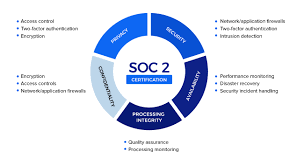As businesses in Texas continue to embrace digital transformation, the importance of protecting customer data has never been greater. Organizations today are expected to demonstrate accountability, transparency, and strong security practices. SOC 2 Certification in Texas helps companies prove that they have robust systems in place to safeguard sensitive information and maintain operational reliability.For IT firms, SaaS providers, financial service companies, and data-driven organizations, SOC 2 compliance is not just a security benchmark—it is a trust-building tool. Achieving certification improves credibility, reduces cybersecurity risks, and enables businesses to compete confidently in both local and international markets.
Why Is SOC 2 Certification in Texas Essential for Modern Businesses?
With Texas being one of the fastest-growing technology and business hubs in the United States, safeguarding customer data has become a top priority for organizations. As businesses increasingly rely on cloud platforms and digital services, customers demand transparency and security assurance. SOC 2 Certification in Texas helps organizations prove they have strong controls in place to protect sensitive data and maintain operational integrity.SOC 2 is an internationally recognized framework developed by AICPA that evaluates how organizations manage data. For companies operating in Texas, achieving SOC 2 certification not only reduces security risks but also enhances credibility in a competitive market. Trust is a key business differentiator, and SOC 2 certification provides independent proof that your organization follows industry best practices.
What Does SOC 2 in Texas Mean for Data Protection and Compliance?
SOC 2 in Texas applies to any organization that stores, processes, or transmits customer data, including IT companies, SaaS providers, cloud service vendors, and financial technology firms. SOC 2 focuses on five Trust Services Criteria: Security, Availability, Processing Integrity, Confidentiality, and Privacy.These principles ensure that systems are well-protected against unauthorized access, data loss, and service disruptions. SOC 2 compliance shows that your controls are designed to protect client information while ensuring system reliability. For Texas businesses serving global markets, SOC 2 is often required to qualify for high-value contracts.
How Does SOC 2 Implementation in Texas Work?
SOC 2 Implementation in Texas involves aligning your organization’s internal processes, technology controls, and risk management practices with SOC 2 standards. The process begins with a readiness evaluation to detect gaps in security policies, system design, and operational workflows.Once gaps are identified, controls are implemented to address vulnerabilities related to data access, system monitoring, encryption, and incident response. Policies are documented, and employees are trained to follow compliance procedures. Organizations must demonstrate continuous adherence to controls, especially when pursuing SOC 2 Type II certification.Successful implementation improves business operations and reduces exposure to security incidents.
Why Hire SOC 2 Consultants in Texas for Certification?
Working with SOC 2 Consultants in Texas greatly simplifies the compliance journey. Consultants analyze your existing environment, design compliant controls, and prepare your organization for audit. Their expertise ensures that no critical requirement is overlooked.With professional SOC 2 Consultants Services in Texas, organizations benefit from structured documentation, risk assessments, and audit preparation strategies. Experienced consultants understand audit expectations and help companies avoid rework, failure, and unnecessary delays.Partnering with SOC 2 Certification Consultants in Texas allows businesses to achieve compliance faster, with higher confidence and lower risk.
How Much Is the SOC 2 Cost in Texas?
The SOC 2 Cost in Texas depends on multiple factors, including company size, number of systems in scope, complexity of IT operations, and whether the organization chooses SOC 2 Type I or Type II.Small companies with simple environments incur lower costs, while large enterprises require more resources due to broader system coverage and longer audit timelines. Costs include consulting, documentation, security improvements, and audit fees.Although certification requires investment, the financial and reputational protection it offers far outweighs the cost.
What Happens During a SOC 2 Audit in Texas?
A SOC 2 Audit in Texas is conducted by an independent CPA firm that assesses whether your controls meet SOC 2 requirements. Auditors examine evidence such as security logs, policies, risk assessments, and incident response records.For Type I audits, the auditor evaluates the design of controls at a point in time. For Type II, the auditor checks operational effectiveness over a period of several months. The final report highlights compliance status and opportunities for improvement.Passing the audit ensures your organization follows best practices for security and governance.
What SOC 2 Services in Texas Are Available for Businesses?
Organizations can choose from a wide range of SOC 2 Services in Texas based on their needs. These services include gap analysis, implementation support, documentation, risk management, training, and audit coordination.Businesses seeking end-to-end support rely on SOC 2 Certification Services in Texas to manage the entire compliance lifecycle. These services reduce administrative burden and accelerate certification timelines.
Why Are SOC 2 Certification Consultants in Texas the Right Choice?
Hiring SOC 2 Certification Consultants in Texas ensures organizations meet complex compliance requirements efficiently. Consultants customize strategies based on business size, industry type, and data sensitivity.They also offer ongoing compliance monitoring to help organizations sustain certification. With consultant guidance, compliance becomes manageable rather than overwhelming.
How Does SOC 2 Registration in Texas Work?
SOC 2 Registration in Texas involves working with an auditor to formally evaluate and report compliance. There is no government-issued certificate, but organizations receive a SOC 2 Type I or Type II report that serves as proof of compliance.This report is often required when onboarding new enterprise clients and participating in business tenders. Registration ensures transparency and accountability in data management practices.
Is SOC 2 Certification in Texas Worth It?
Absolutely. SOC 2 certification enhances trust, improves cybersecurity, and increases business opportunities. Organizations that achieve compliance reduce the likelihood of data breaches, minimize regulatory risks, and strengthen customer relationships.In Texas’s competitive business environment, SOC 2 certification distinguishes companies as reliable service providers.
Conclusion
SOC 2 Certification in Texas is a strategic investment in security, trust, and business growth. With increasing cyber threats and rising customer expectations, organizations cannot afford to overlook compliance.By working with experienced consultants and following a structured implementation process, businesses in Texas can achieve SOC 2 certification efficiently and confidently.



